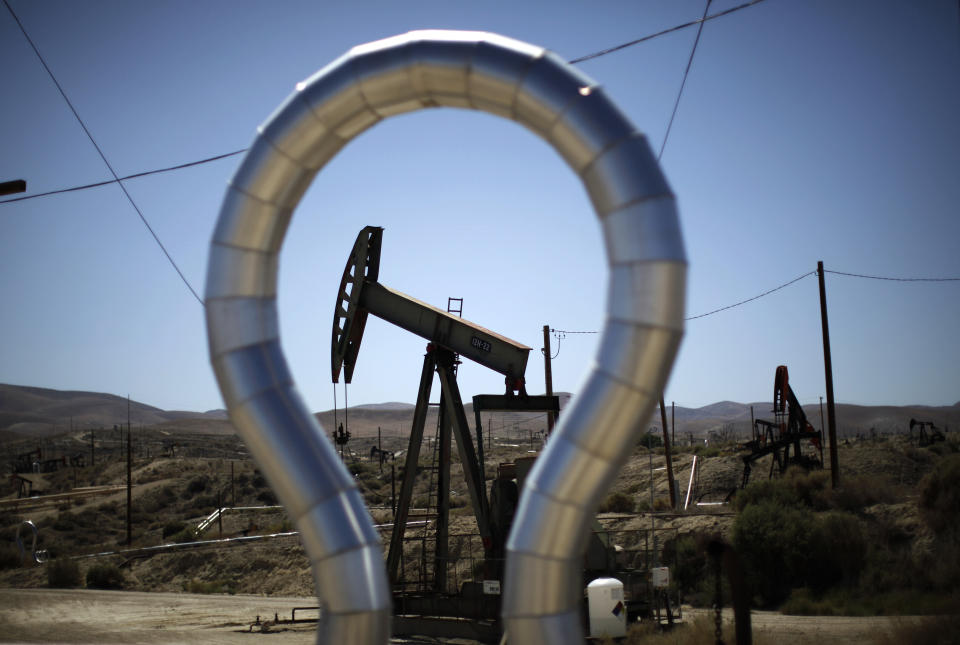Trump Scraps Rule On Potent Greenhouse Gas As Climate Disasters Mount
The Trump administration rescinded regulations on methane Thursday, allowing oil and gas companies to keep emitting a powerful climate-changing gas even as a wave of droughts, powerful storms and extreme heat hit the country.
The Environmental Protection Agency’s long-anticipated changes to the rule scrap federal requirements that producers install technology and establish procedures to detect, disclose and plug methane leaks from most wells, pipelines and storage facilities.
The agency argued that the regulation the Obama administration put in place in 2016 failed to meet legal standards under the Clean Air Act, and unfairly punished small producers with onerous requirements.
On a call with reporters Thursday afternoon, two senior administration officials defended the changes as a more “balanced” approach to regulating methane. One official, whom the EPA declined to name on the record, told HuffPost “emissions are going to continue to go down” despite the rollback and “the notion that it’s going to change that trajectory is inaccurate.”
The rule comes as emissions of methane, which traps 90 times more heat in the atmosphere over a two-decade period than carbon dioxide, reach record levels. Since 2000, scientists estimate methane emissions from the United States increased by close to 5 million tons per year, equivalent to adding 35 million cars to the road, according to a study published last month in the peer-reviewed journal Environmental Research Letters. The spike reflects the drilling boom, driven by hydraulic fracturing, that made the United States a top exporter of gas and oil, said Rob Jackson, a co-author of the study.
“Our increases in the U.S. are coming mostly from oil and gas companies, not because the industry is doing a poor job, but because we’re producing almost twice as much as we were a decade ago,” said Jackson, an earth scientist who leads Stanford University’s Global Carbon Project. “Simply increasing production leads to greater methane emissions. We’re drilling more wells and moving more natural gas around.”

The new rule is only the latest regulatory change the administration has pushed through amid the coronavirus pandemic and ahead of November’s election. In April, the EPA loosened rules on mercury emissions from power plants. In June, the agency rewrote a rule to give pipeline companies more power over skeptical state regulators. In July, President Donald Trump weakened the National Environmental Policy Act, limiting infrastructure reviews and making it harder for polluted communities to challenge harmful new highways or pipelines under the bedrock public health law.
The EPA’s own calculations show the rollback will increase emissions of methane by 336,000 metric tons per year and unleash close to 9,100 metric tons of toxic organic compounds such as benzene into the air around oil and gas operations.
Major oil and gas producers opposed the EPA’s changes. Last year, Exxon Mobil Corp., Royal Dutch Shell and BP publicly urged the agency to maintain regulations of methane. But industry groups lobbied on behalf of the rollback, which most directly benefited smaller producers.
The Independent Petroleum Association of American said the methane rule was an example of the Obama-era EPA’s “‘one-size-fits-all’ approach to regulating this industry,” which it called “inappropriate” and complained “disproportionately impacts conventional operations and small businesses.” The American Petroleum Institute, the industry’s most powerful lobby, said producers would still control emissions under the modified rule.
“We support this revision,” Frank Macchiarola, a senior vice president of policy and regulation at API, said in an emailed statement. “The industry continues to make progress in reducing methane emissions through new technologies.”
Simply increasing production leads to greater methane emissions. We’re drilling more wells and moving more natural gas around. Rob Jackson, Stanford University earth scientist
That progress isn’t enough to keep global temperatures from rising another half-degree to 1.5 degrees above pre-industrial averages, beyond which scientists project catastrophic human suffering. Methane, a colorless and odorless gas that’s virtually invisible without infrared cameras, hit a new global high in 2017. Scientists fear the gas’s potency could bring the world to a tipping point at which the thawing Arctic starts releasing carbon and methane at an uncontrollable rate before policymakers manage to get a grip on human-caused emissions like those from fossil fuels.
“We worry about runaway methane release, especially from the Arctic,” Jackson said. “But my biggest concern is greater emissions from human activities. We’re just not getting the job done.”
This summer has offered a taste of that future. The U.S. Drought Monitor shows three entire U.S. states ― Colorado, Nevada and New Mexico ― are in drought, as is most of Arizona, Oregon, Utah and Wyoming and a large swath of California. Federal forecasters last week updated their outlook for the Atlantic hurricane season, predicting an “extremely active” period with up to 25 named storms. A derecho, or typically rare inland hurricane, wreaked havoc across the Midwest this week, destroying 10 million acres of crops in Iowa and leaving 600,000 without power.
Democratic presidential candidate Joe Biden, who has vowed to pursue a more ambitious climate agenda than the previous administration in which he served as vice president, would likely attempt to reinstate the rule if he wins in November. But the legal timeline could be challenging. Crafting more stringent regulations would take years.
To weaken the existing rule now, Jackson said, is “misguided and a lost opportunity.”
“We’re sending a message to other countries that we don’t care about our methane emissions,” he said. “It’s short-sighted and unfortunate.”
Related...
EPA Loosens Rule On Toxic Mercury Emissions As Pandemic Rages
GOP Quietly Pushes Through Long-Sought Priorities As Pandemic Rages
EPA Mounts A New Strike On States’ Rights, This Time To Boost Pipeline Companies
Love HuffPost? Become a founding member of HuffPost Plus today.
This article originally appeared on HuffPost and has been updated.

